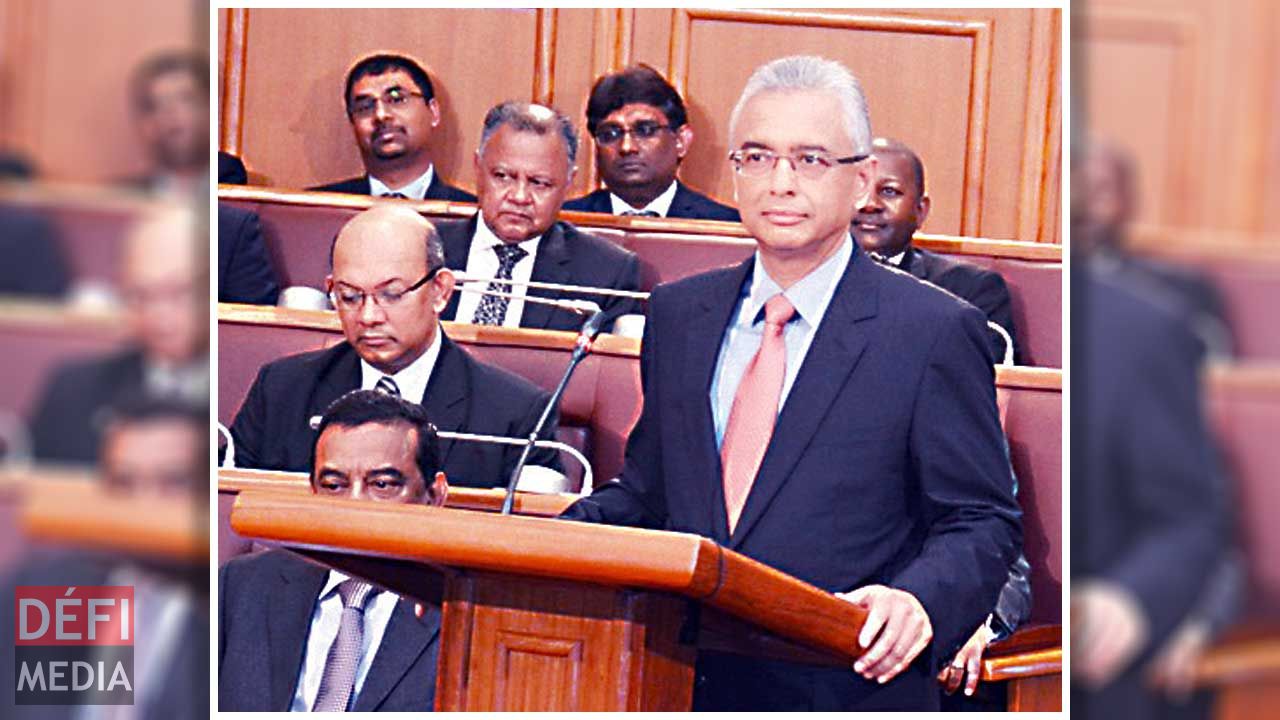
The 2017/2018 Budget will be presented on 8 June 2017. This Budget comes in a particular context, with the debate on the Metro Express project still rife, the ongoing discussions on the proposed minimum salary, the various projects in the pipeline struggling to start, all these against the backdrop of the post-BAI crisis. Will the next Budget succeed in creating a new feel good factor?
Publicité
 The Budget 2016-2017 will be presented to the nation on 8 June 2017. This budgetary exercise is different from previous ones since it will be read by none other than the Prime Minister himself, as he holds the portfolio of finance minister. The preparation is in full swing, with the traditional pre-budget consultations with all social and economic stakeholders. However, contrary to last year, the online ‘mauritiusfinance.com’ platform is not so active. For recall, the platform was launched last year to encourage greater digital democracy and participative democracy, so that members of the public from all walks of life could participate, provide proposals and debate on national economic issues.
The Budget 2016-2017 will be presented to the nation on 8 June 2017. This budgetary exercise is different from previous ones since it will be read by none other than the Prime Minister himself, as he holds the portfolio of finance minister. The preparation is in full swing, with the traditional pre-budget consultations with all social and economic stakeholders. However, contrary to last year, the online ‘mauritiusfinance.com’ platform is not so active. For recall, the platform was launched last year to encourage greater digital democracy and participative democracy, so that members of the public from all walks of life could participate, provide proposals and debate on national economic issues.
As is the case every year, the main challenges of the Budget remain more or less the same: Reduce unemployment, especially among the youth, boost economic growth, attract more investment, tackle poverty, stabilize public debt level and continue the reforms programme. As a prelude to the Budget, the Business Facilitation Bill has already been voted in Parliament on Tuesday 16 May 2017. The objective is to provide for a series of amendments to the legislative framework that are necessary for the removal of constraints in relation to permits, licences, authorisations and clearances to further facilitate the doing of business, and for related matters. The last time a Business Facilitation Bill was enacted was in June 2006, by the then Finance Minister Dr Rama Sithanen, who came up with drastic changes to open the Mauritian economy and eliminate lengthy bureaucratic procedures.
Budget orientation
Our economy is being driven by the real estate sector which is attracting the lion’s share of foreign direct investment, while other productive sectors are struggling to sustain. The next budget will necessarily need to reduce our dependency on the real estate sector and encourage investment in those productive sectors more apt to create long-term durable jobs. On the other hand, it is increasingly being perceived that Mauritius is living beyond its means, given the high level of the national debt and the highly indebted private sector, as well as high consumer and household debts. A higher growth will stem from a productivity boost. Indeed, the latest Business Confidence Indicator by the Mauritius Chamber of Commerce and Industry has increased, but is it sufficient to bring about a major stimulation in economic growth? Will the Budget be business as usual, with the same remedies for the same ailments, or another drastic departure from established customs?
Recurrent measures
Among the main measures announced last year, there is the national free wifi network. It is likely that the network will be extended to cover more areas in order to connect more citizens. Moreover, the finance minister will most likely remove tax on another series of items, as is the case every year, in line with the objective of making Mauritius a Duty Free Island. Other recurrent measures include social housing projects, measures meant for small and medium enterprises, incentives for traditional productive sectors such as agribusiness and manufacturing. Like every year, the Budget will undoubtedly contain symbolic measures for planters, breeders and fishermen.
Unemployment
The unemployment rate has declined from 7.9% in 2015 to 7.3% in 2016. This shows that direct and indirect redundancies following BAI crash and the eviction of street hawkers have been largely offset by new job creation. However, it should also be noted that many youths currently being employed under such programmes as Youth Employment Programme or Back to Work Programme are temporarily put off the unemployment figures and these youths will be again unemployed at the end of the programme if the system does not absorb them.
Public debt
Public debt has reached Rs 288.7 billion in March 2017, equivalent to 65.6% of Gross Domestic Product. The public debt level as at March 2016 was Rs 267 billion. Thus, public debt has increased by more than Rs 20 billion over a 12-month period. In comparison, in December 2014, the national debt level was Rs 237.7 billion. One of the factors contributing to the growing debt level is the depreciation of the rupee against the US Dollar. A large chunk of our debt is in USD and the dollar rate has risen from Rs 32 in December 2014 to Rs 36 in March 2017.
Economic slowdown ?
Most economic operators are of the view that there is currently an economic slowdown prevailing in the country. This is mainly attributed to a reduced consumer expenditure, which is the result of lower purchasing power. But what explains this slowdown, if any? It should be noted that there have been massive monetary injections in the economy since early 2015, firstly with the payment of the Pay Research Bureau report in the public sector, then the pension hike to Rs 5,000. In addition, billions have been injected in the economy in the form of refunds to ex-BAI clients. Moreover, Foreign Direct Investment has been on the rise during the last couple of years. Therefore, where is all this money going?
Super Cash Back Gold
The ‘Super Cash Back Gold’ plan of the defunct BAI group continues to be in the spotlight. Hundreds of investors in these BAI financial products are still waiting to be refunded their dues. Tired of waiting for a positive outcome, many have decided to resort to a hunger strike, in order to pressurize the government into finding a solution. On Monday, the prime minister agreed to meet a delegation of the hunger strikers. While he reassured that finding a solution for former clients of the Super Cash Back Gold and the Bramer Asset Management products remains a priority for the government, he said it is indeed difficult to find that solution in the current context and the government is exploring all avenues. He has asked those resorting to hunger strike to be patient and to wait till Friday for a solution to be announced. In a communiqué issued on Monday, the Prime Minister’s Office reminded that the nTan report on the BAI crisis referred to a ‘ponzi scmeme’. The debate on whether there really was a ponzi scheme is ongoing on social networks. For some commentators, if it was indeed a ponzi scheme, then it is not the role of government to compensate investors who have fallen prey to dubious schemes. But others have a different opinion on the issue. The financial products offered by the BAI group were approved by financial regulators and the public had no reason to doubt such products, on the understanding that they are constantly monitored, by law, by the regulators. Therefore, the state is entirely responsible for the situation if ever regulators have failed to act in the interest of investors.
Business Facilitation Act II
The Business Facilitation Act was voted in Parliament this week. The objective is to provide for amendments to the legislative framework that are necessary for the removal of constraints in relation to permits, licences, authorisations and clearances to further facilitate the doing of business, and for related matters. The law makes provision for the issue of electronic certificate of incorporation. A number of other measures are provided to further streamline administrative procedures, cut down processing time of applications and improve the level of services in the public sector.
Mauritiusfinance
Last year, the ‘Mauritiusfinance’ platform was launched on social networks to enlist the participation of all citizens in the budgetary exercise. At its peak, the platform reached more than 350,000 online users and nearly 17,000 persons were active contributors. Many proposals gleaned from members of the public found its way into last year’s Budget. This year, however, the platform seems to be more or less dormant. Though members of the public have been encouraged to send their proposals by email, there is not, unlike last year, any debate on economic, social and national issues on the platform on social networks.
Business Mauritius calls for greater focus on manufacturing sector
The Prime Minister and Minister of Finance met with representatives of Business Mauritius last week for consultations regarding Budget 2017-2018. Talks centred around the manufacturing industry, the opening up of the economy and the recruitment of foreign labour.
 During the pre-budget consultations, Pravind Jugnauth, Prime Minister and Minister of Finance, met with the representatives of the private sector in the Lunch Room of the National Assembly. For Arnaud Dalais, president of Business Mauritius, there is a prevailing spirit or partnership between both sides. The upcoming fiscal year would witness an economic revival.
During the pre-budget consultations, Pravind Jugnauth, Prime Minister and Minister of Finance, met with the representatives of the private sector in the Lunch Room of the National Assembly. For Arnaud Dalais, president of Business Mauritius, there is a prevailing spirit or partnership between both sides. The upcoming fiscal year would witness an economic revival.
The importance of the recovery is a leitmotif in 2017. Growth over the twelve-month period ending December 31, is set to reach 4%, with a pick-up in the construction sector, key industrial sectors such as tourism and financial services, which are progressing at a decent pace. However, other sectors are facing difficulties on the world market.
For Business Mauritius, among the sectors requiring special attention is the manufacturing industry, especially operators targeting the domestic market. The challenge now is to boost this sector, to help it export its products, at least in the region. A new plan is expected to encourage local businesses to move in this direction.
In the construction sector, there is a shortage of manpower, according to economic operators. Business Mauritius is asking that the government facilitates the issuance of work permits for foreign workers. The private sector lobby also called for a partnership with the government to implement a training program for Mauritians in the construction trades.
The country has reached a stage where the economy must continue to open up so that it welcomes foreign investors and talents, according to Arnaud Dalais. It is very important to have access to foreign labour because it "helps to preserve the employment of Mauritians".
Government and employers also discussed the minimum wage. Business Mauritius stressed the need to be very careful in introducing a national minimum wage. It should not affect key economic sectors, which are highly dependent on competitiveness. Business Mauritius says it is for this measure, but conditionally.
Accelerating digital transformation
The Outsourcing & Telecommunications Association of Mauritius (OTAM) was represented by its president Ken Arian. In its memorandum submitted to the Ministry of Finance, the association focuses on the digital transformation of the economy. OTAM says this sector creates value for the economy with its 750 companies, and around 23,000 employees.
(Reporting by Kamlesh Bhuckory)

Notre service WhatsApp. Vous êtes témoins d`un événement d`actualité ou d`une scène insolite? Envoyez-nous vos photos ou vidéos sur le 5 259 82 00 !


























